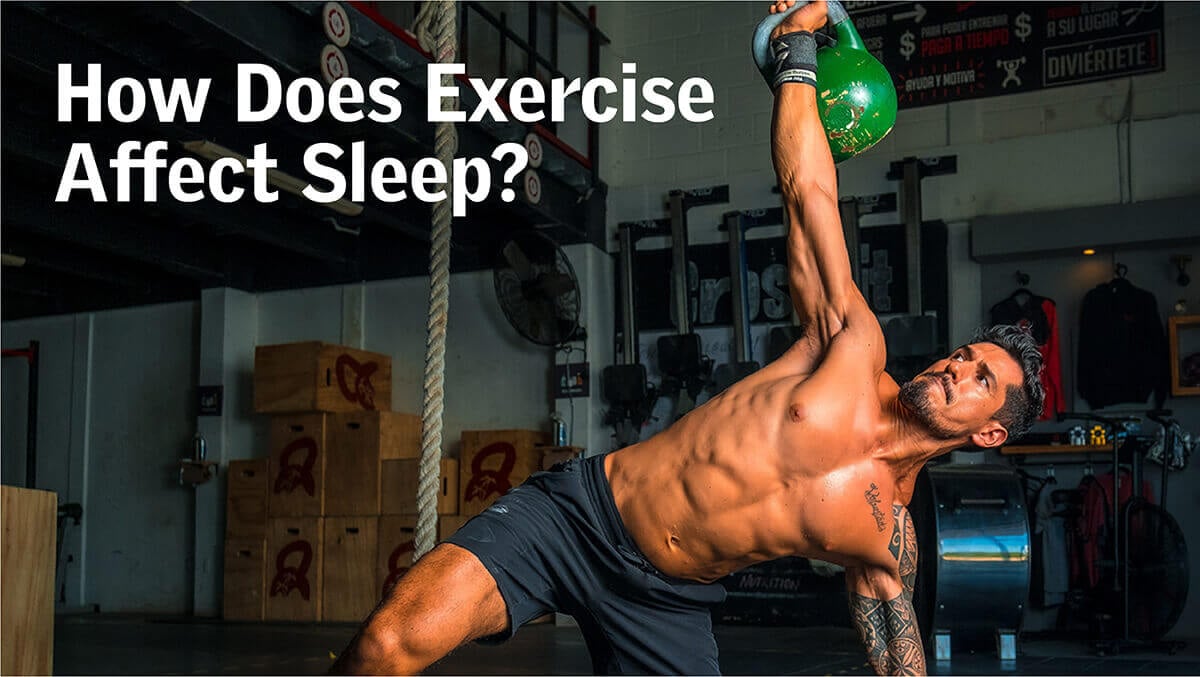There are several factors that are known to affect sleep, such as routine, health, caffeine intake, and conditions like chronic pain or insomnia. Exercise is an additional factor that can influence sleep, but you may not be aware of this fact. If you’re wondering, “How does exercise affect sleep?” scientific research can provide some insight on the relationship between exercise and sleep. You may have heard that exercise improves sleep, and in many cases, this can be true.
- Is It True That Exercise Helps You Sleep?
- Can Exercise Cause Sleep Problems?
- Can Pain From Exercise Disrupt Sleep?
- Sleep Better with Aricove
Is It True That Exercise Helps You Sleep?
It is not uncommon for people to wonder how to improve their sleep. Perhaps you have heard that exercise helps you sleep, and you’re curious if this is true. Fortunately, it turns out that exercise might be a remedy for insomnia.
A review of six studies including 305 participants found that people who complete exercise interventions involving either moderate intensity aerobic exercise or high-intensity resistance training experience improvements in sleep quality and fall asleep faster when compared to individuals who do not participate in exercise interventions.
A second review found that exercise improved sleep quality for both young and older adults, but moderate exercise appeared to be more beneficial than vigorous physical activity.
Scientists have hypothesized that the benefits of exercise for sleep occur because of physiological processes in the body arising from exercise. For instance, exercise releases endorphins, increases the body temperature, and results in energy expenditure, all of which increase the requirement for sleep to rejuvenate the body.
Can Exercise Cause Sleep Problems?
Multiple studies have shown that exercise can improve sleep, but some people worry about exercise causing sleep problems, since it is a rather stimulating activity. In some cases, exercise before sleep can actually be problematic, instead of improving sleep quality. In fact, one recent study in the Journal of Health Psychology found that people who exercised in the evening went to bed later and had worse sleep quality when compared to those who exercised in the morning.
A second study revealed that people who exercised in the evening fared no worse than individuals who didn’t exercise at all, but people who exercised in the morning had the best sleep quality. If you enjoy exercising in the evening, or this is the only time you can fit it into your schedule, exercise may not cause sleep problems for you. On the other hand, if you find that you have trouble sleeping when you exercise in the evening, it may be that you are getting your body too stimulated, and you would benefit from working out in the morning in order to enjoy the benefits of exercise and sleep.
If evening exercise is keeping you awake, you may also consider using a weighted blanket for insomnia, since it can help you to relax and make it easier to fall asleep. A bamboo weighted blanket is luxuriously soft and comfortable, which allows you to fall into a deep sleep, even if exercise has revved up your engine in the evening hours.
Can Pain From Exercise Disrupt Sleep?
While exercise, and especially morning workouts, can make the body tired and promote a more restful night of sleep, some people may run into soreness or pain from exercise, which can understandably leave them tossing and turning at night. In this case, if soreness from exercise causes sleep problems, you may find that the benefits of weighted blanket therapy pertain to you.
A new study in the Journal of Pain shows that the deep touch pressure from weighted blankets can reduce pain, making these blankets helpful for promoting sleep among people who are sore from exercise. A weighted blanket of 15 lbs was found to be most helpful for reducing perceptions of pain, when compared to a lighter 5 lb blanket. If exercise generally improves your sleep but occasionally leaves you too sore to get comfortable, a heavy weighted blanket offers a simple remedy.
Sleep Better with Aricove
A weighted blanket from Aricove can be the perfect complement to your exercise regimen if you find that physical activity helps you sleep. A weighted blanket provides you with comfort and deep pressure to soothe muscles that are sore from exercise, and if you are overstimulated from an evening workout, a weighted blanket can calm you for a restful night of sleep. While exercise in general can improve sleep, especially when performed in the morning, some people may also need a weighted blanket to improve sleep. Fortunately, Aricove offers a weighted blanket for adults in various weights to meet just about any need.


 United States (USD $)
United States (USD $)